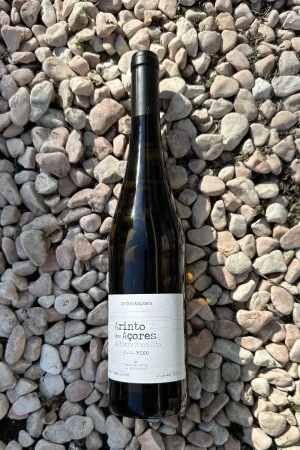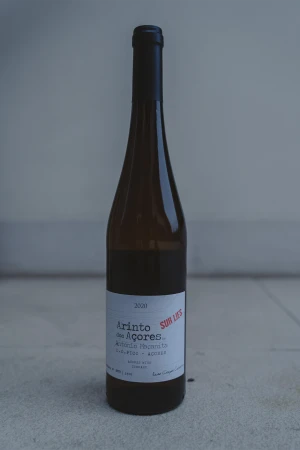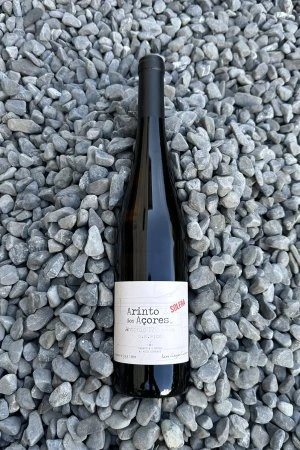
Azores Wine Company
To restore our currais, 30 young men worked seven days a week for three whole years.
Filipe points to the small, drystone, black basalt walls, snaking as far as the eye can see, about half a metre high, and all laid by hand without the use of mortar.
"The Azores are the secret gardens of the Atlantic," I say to Simona out of the blue, as I place my cup of American coffee on the table of the bar-bistro-cum-emporium-co-working space where we have been working for hours.
I have just finished researching the most remote places where wine is produced and I have set my sights on the Azores - tiny atolls of black lava dominated by the mountains that gave birth to them - where pioneers like António Maçanita, Filipe Rocha and Paulo Machado are changing the world of wine.
A few days later, we are aboard a plane with a ticket to the island of Pico. A magical place, always ready to amaze us, even in the future, with its Arinto do Açores Solera. However, let us proceed in order and enjoy the flight.
Arinto do Açores Solera is a real revelation from this winery. Discover it along with all the other exceptional labels.
There is nothing but ocean for hours on end. White light and heat beat through the plane window. Then shapes begin to appear on the horizon: islands with volcanic peaks, emerging from the water like knees in a bathtub.
Below us, Pico reveals itself amidst the sparkling cerulean water, its towering volcano atop the centre of the island.

Until the beginning of the 15th century, these islands were deserted. Then Portuguese explorers discovered them and populated them with nobles, indentured servants and prisoners who were given the choice between prison or exile. Today, descendants of whalers and privateers who have become fishermen, farmers and winemakers live here, displaying a sense of inner peace born of the inevitability of the daily battle with nature.
"There’s so much energy!" This is the exclamation shared by Simona and the crew accompanying us (to capture the photographic and video material) as soon as we land. One has the feeling of being at the edge of the world, in an area not entirely conquered by humanity.
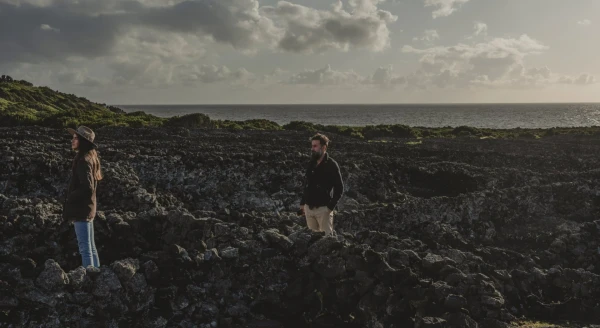
The eye sweeps over this lunar landscape. The pitch-black lava rock surrounding us is as dark as night and seems be immersing us a black and white film whose soundtrack is the waves crashing and booming on the cliffs. The sole points of colour interrupting this monotone palette are the green of the vegetation, the whitewashed fences and the shutters of the houses.

On the evening of our arrival, we decide to have a barbecue, as we are not going to meet our host Filipe Rocha until the following morning. Whilst our photographer Dave, who conscientiously travelled replete with trusty ukulele, cheers us up strumming out tunes, Dani from the production team hops agilely between the makeshift grills to keep everything from burning to cinders.
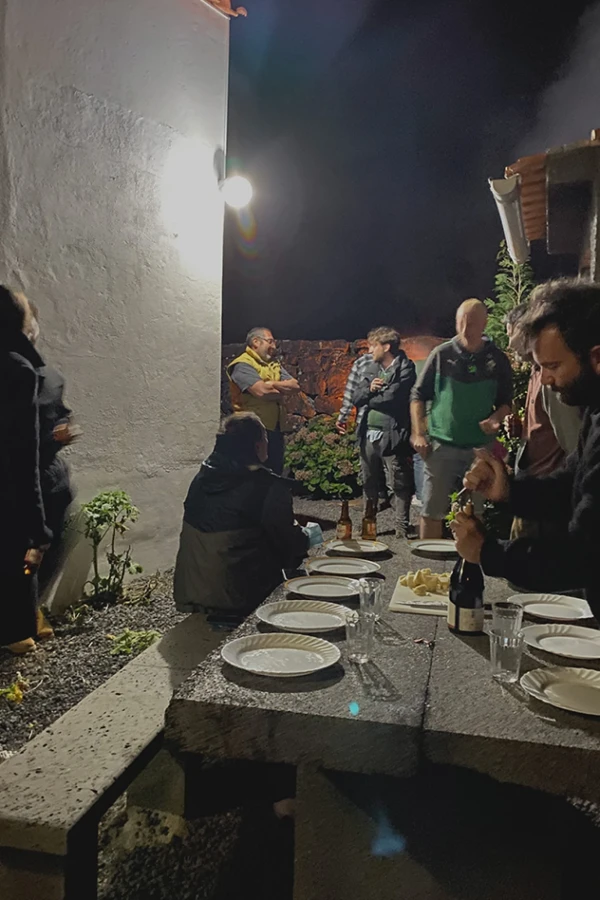
The sunrise I admired here in the Azores was, to date, the most beautiful of my whole life. Alone, clutching a mug of coffee, I am perched atop a "currais", breathing life and oxygen into my soul.
"I am not James Bond... I am not James Bond!" I repeat as I drive up the dirt slope of the Azores Wine Company and admire its futuristic structure in the distance. Impossible not to be impressed and impossible not to imagine myself in a 007 movie. If it wasn't a winery, it could be the headquarters of Spectre.
The Azores Wine Company's Adega ("winery" in Portuguese) with its glass planes, smooth concrete, and rough stone stands at the foot of the Pico volcano, surrounded by its own vineyards defended by a labyrinth of currais just a few hundred meters from the fury of the Atlantic Ocean.
"You are walking on soil that has been home to vineyards for more than 550 years!" shouts Filipe in welcome from the entrance of the winery. What a character he is! His energy is matched only by that of the island.
The winery we find ourselves in came into being in 2016, two years after the company was founded, and 6 years after the multi-award winning, restless and disruptive winemaker António Maçanita (as he calls himself on his website) recovered a practically extinct native vine, Terrantez do Pico (there were only 89 plants left), with the desire to do something different. This was the beginning of the adventure .
Filipe recounts that the island once boasted up to 15,000 hectares of vines and produced amazing wines, which were found, no less, in the cellars of Thomas Jefferson, the European aristocracy and the Russian czars.
"In the 19th century it was all wiped out by phylloxera* and, even today, there are still old vineyards hidden under the jungle surrounding us."

The reclamation and recovery of vines are at the origin of the company's history because they are the birthplace of its philosophy: to recover the native vines of the Azores and give them back to the world.

For many years Filipe Rocha was the Executive Director of the Azores School of Hospitality and Tourism Training and was instrumental in changing vocational training in the region and promoting the wines of the Azores. Since 2016, he has been Financial Director of Azores Wine Company and, in my opinion, much more besides. Together with António Maçanita and Paulo Machado, he is the mind of the company but, first and foremost, the heart.
This man is a born thespian: when he speaks, he instinctively uses rhythm and time to be heard and understood. A gesture, a silence, even a short series of words, all combine to convey Filipe's evident love and devotion for this land.

"It is always surprising to see the men from these parts building the currais. It is an art they seem to have in their blood." In respectful silence we gaze in admiration upon the reticulation of low, drystone walls snaking out before us as far as the eye can see. Hand-built from black basalt rock, and laid without the use of mortar, they are about half a metre high and are meant to protect the grapes from the wind and the cool climate of the Azores. "To restore the currais of Azores Wine Company's 120 hectares, 30 young men worked seven days a week for three whole years". Filipe knows he has dropped a bomb. We are both astounded and impressed.
These lands bear the signs of the perennial struggle of two forces: man and nature. Forces which, here on the Island of Pico, are not antagonists but rather allies, united by the common intent of living and thriving.
On the one hand, there are the vines growing up between the cracks and crevices in the lava and spreading out close to the ground to prevent the ocean wind from breaking them; and, on the other, there are men placing stones under their branches to raise them up and enable the grapes to grow.
The use of machinery here is unthinkable. Men work manually like tailors on each and every plant, passing on a heritage that is hundreds of years old. I am reminded of a sentence I read somewhere before leaving: "You don't have to be crazy to make wine in Azores, but it helps!"


Upon entering the cellar, the feeling of being in an Ian Fleming novel returns. The structure has a square shape reminiscent of old water cisterns which lend it the air of a typical monastery cloister on the island. I merely think I'm in Safin's Poison Garden in No Time to Die. (007 is another of my passions).


We go up to the terrace, a belvedere from which we can see and smell every fundamental element in the production of Azores Wine Company's wines: the ocean, the wind, the volcano and the lava.
Filipe decides that this is the right space-time to let us taste the fruits of all the work he has told us about. I have selected six of them and, if before describing them one by one, I indulge in a spoiler out of enthusiasm, I hope I will be forgiven: they are all superb and totally unlike anything I have tasted and discovered so far.

Arinto dos Açores. Made from a grape variety indigenous and exclusive to the Azores islands, the only trait shared with the mainland Arinto is its name. The very essence of the Azores Wine Company, no other grape in the world is its genetic match. As I drink it, I have the sensation of sitting on a rock over which a wave has just broken.
Arinto dos Açores Sur Lies. If previously I thought I was on a rock, now I am swimming in the middle of the ocean. A 'saltier' wine but with more body and a hint of wood. The nose is reminiscent of the low tide, when the waves recede and the rocks emerge. Neither Simona nor I have ever drunk such a mineral tasting wine in our entire lives. We are completely in love with it.
Terrantez do Pico. This too is a grape variety that only exists in the Azores. Recovered by António Maçanita just in time, there were only 89 plants left in the world. Completely different from the others, its floral character is immediately recognisable to the nose. It is a finer, more delicate wine as a result of a more exclusive production process.

Filipe explains that the next bottles we are going to taste come from older vineyards located in the Criação Velha area in the north of the island, municipality of Madalena. Small lots for very select productions.
Canada do Monte. Produced from an 80-year-old vineyard. I realise we are speaking a different language with this one. The concentration is deeper. Salt and iodine are omnipresent. A wine as explosive as the volcano it has in its DNA. A “slap of the sea”.
Vinha Centenária. Produced from a 100-120 year old vineyard. Each sip is like a flight over the ocean. You can almost feel the sea crashing against the rocks. The balance between acidity and concentration is nothing short of amazing. This is a wine that can be stored in the cellar until 2035 without any problems, and will only get better over the next 10 years.
Vinha dos Utras. Produced from a 60-80 year old vineyard. The very apex of the work at the Azores Wine Company. You are struck by an abundance of orange peel, tangerine, iodine, graphite and a hint of smoke. Extremely elegant, fine, sophisticated yet eclectic. it is truly evocative.
If anyone was seeking a more authoritative opinion than mine, here it is: Robert Parker* awarded more than 90 points to all the wines previously described. In particular, Vinha Centénaria 2018 received 95 points and Vinha dos Utras 2020 was even awarded 96. These are staggering numbers.
*Robert Parker is a Wine Advocate, the best known and most influential in the world. His wine ratings, which range from a minimum of 50 points to a maximum of 100, are a determining factor in setting wine prices. His quality scale, different from all other 20-point rating systems, has in fact established itself as the standard of the wine industry.
The Azores have taught me much and have left their mark on me. Now that I am sitting in my study writing this article, I am thinking about Filipe and how much I would like to be in his Adega, sitting with him and Simona on a currais of the vineyard, a glass of wine in my hand, while our laughter overpowers the roar of the ocean.
Yes, the Azores have definitely left their mark on me. Literally.
One year later
It is January 2024, I am on horseback in Kenya when my phone rings. I could’ve imagined anything but to see the name Filipe appear on the screen. My balance teetering momentarily, a broad grin breaks out on my face.
When he begins talking to me, I am in real danger of falling off my saddle. His words are totally unexpected and they transform into reality something which, since we'd first met on the island of Pico, had just been a long-held expectation.
The experiment has been successful and, after many years of work, the Arinto do Açores Solera is finally ready!
Become an Explorer
Every month we will present an unknown and exclusive winery we have discovered. Every month you will receive what we consider to be its best bottle delivered directly to your door: a wine that is always new, exclusive and surprising.
I am thrilled, incredulous, happy.
Filipe continues: We managed to allocate 102 bottles to the Italian market.
I can barely believe it. 102 bottles, exclusively set aside from a yield of just over 3000. A wine I had only sampled a pre-release of, when still not yet at its peak. And already then I’d been totally won over.
It is an Arinto dos Açores, a wine of which I am greatly enamoured, and was produced with the Solera* method using the 2018, 2019, 2020 and 2021 vintages.
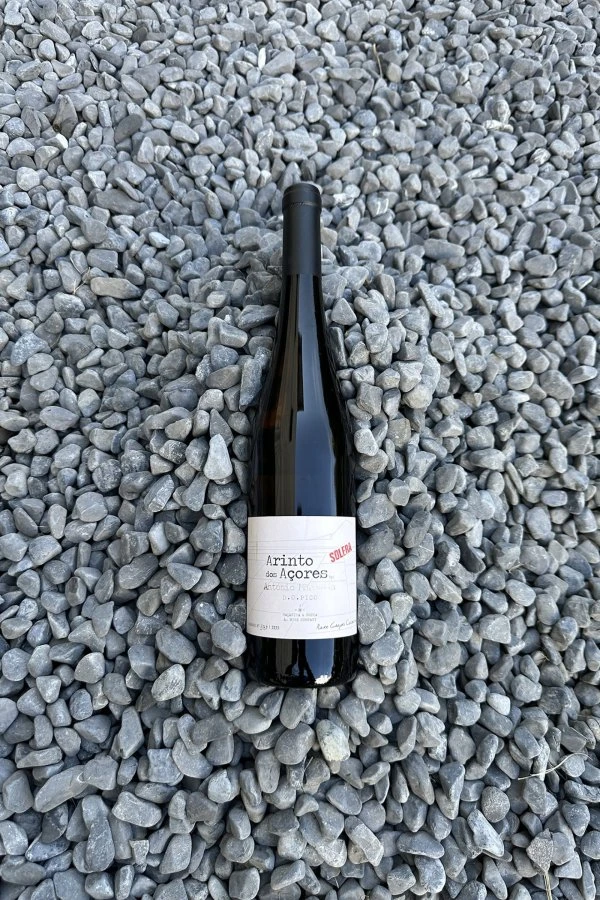
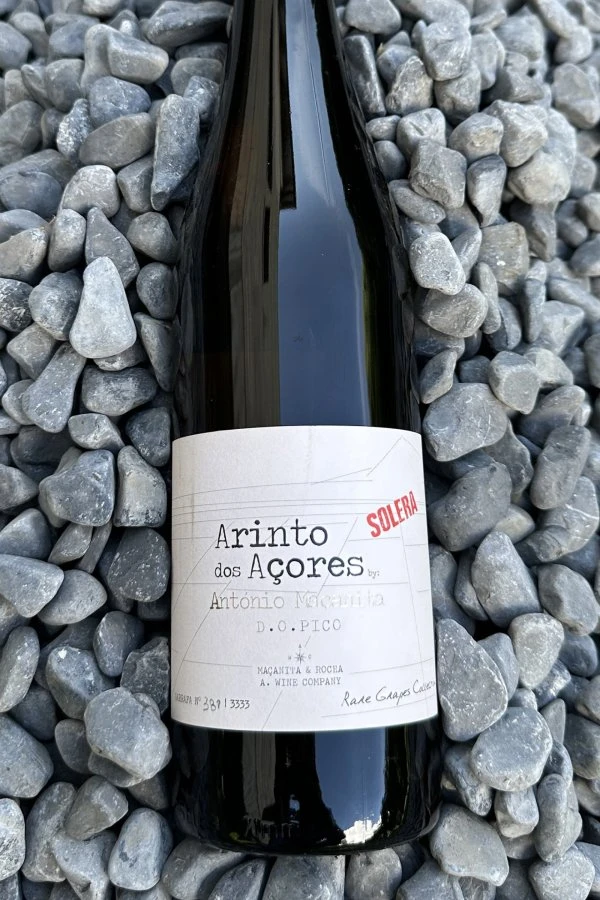
*Solera is the maturation method for fortified wines and is also called 'dynamic ageing'. It is used to ensure a constant quality of organoleptic properties over time, since the ageing of fortified wines can last up to tens of years.
Filipe is enthusiastic. He describes a three-dimensional wine he cannot hide his love of.
On the nose you can more readily discern the method it was made with; in the mouth, though, you are sent soaring straight to the island of Pico. - he tells me - The freshness, the minerality, the acidity and the volcanic touch are all characteristic of the place where Arinto comes from. There are hints of seaweed, iodine, honey and citrus fruits. A fantastic wine that really lends itself to incredible food pairings.
His words and the opportunity to have these 102 bottles literally electrify me.
Never before had a producer called me to speak of and propose the latest wine born in his winery.
And what a wine it is! And available exclusively at that!
I set my horse off at a gallop, the sun burning down on my skin, the wind rushing up aginst me and I feel an immense energy bursting through every cell in my body.
It must be Africa - I think.
Then I think again: No, it was Filipe's words.

Subscribe
Every month we will present an unknown and exclusive winery we have discovered. Every month you will receive what we consider to be its best bottle delivered directly to your door: a wine that is always new, exclusive and surprising. If you choose an annual subscription and pay in a single instalment, you will receive a 10% discount.











